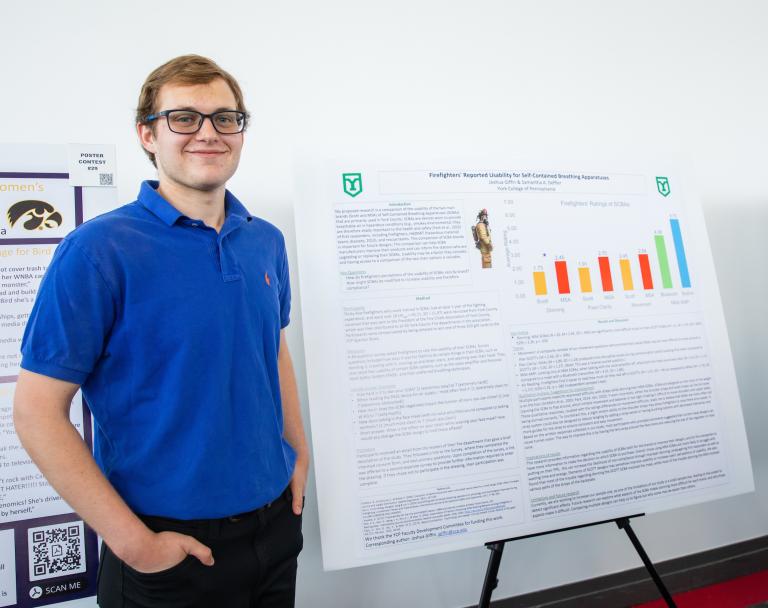Recent Psychology Grad’s Research May Lead to Improvements in Fire-Fighting Equipment

Psychology graduate Josh Giffin of Red Lion has been volunteering with York County fire companies for the past two years. He moved to the area from Delaware to follow his older sister Evelyn ’23, a Professional Writing and Literary and Textual Studies graduate who had a great experience, to York College. Now, his academic and research interests may lead to improvements in the equipment he and his fellow York County firefighters use.
Research on SCBAs
Josh collaborated with Associate Professor of Psychology Samantha Deffler on a study of the perceived usability of self-contained breathing apparatuses (SCBAs) by firefighters. “Josh is a volunteer firefighter in York County,” she said, “so he was able to get a survey we created out to the fire companies in the area. The goal of his independent study is two-fold: a white paper outlining pros and cons of common SCBAs to send to local firehouses, and a peer-reviewed journal article once we get some more data.”
Josh’s research fits very well with his future aspirations. After graduating from York College, he plans to study human factors engineering–how people interact with technology. “Human factors engineering is all about usability and decreasing human error,” he said. His advisor, Professor of Psychology Jennifer Engler, suggested this area of study and helped Josh get in touch with the director of Georgia Tech’s Center for Advanced Communications Policy, where he spent last summer researching the usability of medical devices.
A desire for more experience in this area to prepare for graduate school and his interest in firefighting led him to the independent study comparing brands of SCBAs. “I have used them, and there’s improvement to be had,” he said.
Josh sent a survey to 43 fire companies, and 31 responded. He’s now reaching out to fire stations in MD and NJ to expand the study geographically and get more participants and data. “Some of the data collected indicate which systems are harder to put on and to move around in, which means firefighters are less likely to wear it, increasing noncompliance. That puts firemen and others in danger.”
Becoming a Firefighter
Josh came to York College “with absolutely no knowledge” of firefighting. He had a full schedule that included his classes (he made the Dean’s List for three years), work at the Spartan Store, ultimate frisbee competitions, and participation in several student clubs, including serving on the executive board of the Psychology Club. On top of all of that, he took classes at the York County Fire School to complete basic firefighter training and some advanced training.
“I’ve studied topics like hazardous materials awareness and operations, fire ground support, exterior and interior firefighting, and took advanced training in vehicle rescue and pumps,” he said. He is also licensed to operate certain pieces of equipment and is a volunteer firefighter for Laurel Fire Company #1 in Windsor, PA.
Research Results
Josh sees several opportunities for using the data on SBCAs that he has compiled through his research project.
“Fire companies could compare the advantages and disadvantages of the SCBA systems,” Josh continued, “looking at how hard it is for firefighters to move around, to reach around and overhead, to climb stairs or crawl. There are also other things to consider, including which brand has the best voice amplifier, which device makes it easier to read how much air is in the system, and which has the better buddy breather system in the event of an air emergency.”
“This is one study; however, brands could use the results to improve their systems,” he said. “They could use the data as a guide to what firefighters prefer and increase competition in the industry, which would be good. It would push innovation.”




